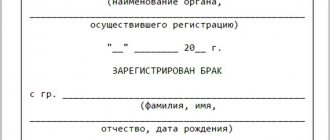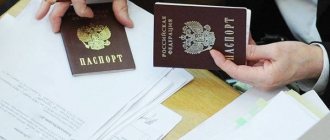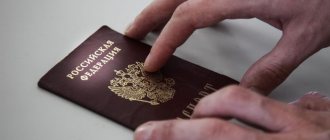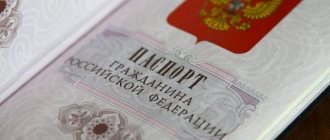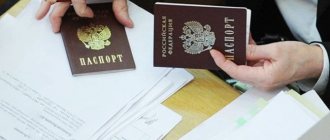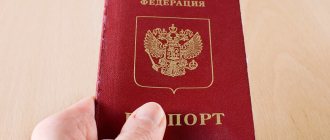Home » Registration of citizens » What are the consequences of illegal registration in an apartment
June 23, 2020 No comments
When moving to another place of residence, whether within one locality or to another region, you must first decide on housing. Nowadays it’s not difficult to find a place to live, but you also need to remember about the need to register.
Individual citizens solve this issue by applying for illegal registration services. Unscrupulous citizens or companies offer to register at a fictitious address in a short time. However, such actions contradict the norms of current legislation and entail serious penalties.
In this article, we will look at the consequences of violating the rules of registration, as well as the consequences of living at a different address than the registration address.
What is fictitious registration
Fictitious registration is a procedure for registering with the migration service, during which the applicant provides knowingly false information to the state. authority, submits false papers, or deliberately registers in an apartment in which he does not intend to live.
Also, registration will be considered illegal if the owner of the living space, registering an individual, does not actually provide him with housing for actual residence.
In accordance with the provisions of the Law of the Russian Federation of June 25, 1993 N 5242-1 “On the right of citizens of the Russian Federation to freedom of movement, choice of place of stay and residence within the Russian Federation”, the awareness that registration is done only “for show”, with actual reluctance provide an apartment for living, as well as submitting false data when registering registration entails recognizing it as fictitious, i.e. illegal.
In case of violation of legislative norms regulating the procedure for registration of individuals, violators are punished by applying appropriate administrative or criminal penalties to them.
If illegality during the registration process is proven in court, for example, forgery of documents or fraudulent actions, then the offender will be punished.
Fictitious registration: new provisions
Any business that generates income is very attractive to scammers. Well, there are a lot of offers to register in a hostel or private house on the market for such services. But such actions of private owners are subject to violation, since only the Migration Service of the Russian Federation can deal with this.
The Law of the Russian Federation of December 3, 2013 “On strengthening liability for violation of the rules of registration and migration registration on the territory of Russia” imposes prohibitions on:
- To provide inaccurate or unreliable information for registration;
- Without the intention to live in this residential premises;
- Without the consent of the apartment owner.
Failure to comply with these provisions may result in a citizen being subject to administrative liability or criminal prosecution.
Responsibility measures
Previously, at the legislative level, only a fine was applied as liability for illegal registration in an apartment in which many persons were fictitiously registered. But since 2013, the state has tightened penalties for such violations.
Currently, illegal registration is not an administrative offense, but a criminal offense. In 2014, the corresponding corpus delicti was included in the Criminal Code of the Russian Federation.
The legislation does not make a distinction between permanent or temporary registration, and it does not matter whether the registered person is a foreign citizen, a Russian citizen or a stateless person. Regardless of this, the homeowner will be held accountable by law.
But it is wrong to think that sanctions for fictitious registration await only the owner of the apartment. If the fact of forgery of documents or collusion with the owner of the property is revealed, punishment will be applied to both parties to this malicious agreement - the registered person and the owner. The basis for punishment is the fact of detection of illegal registration.
The owner of the property may be exempt from punishment if he contributes to the discovery of a residential premises in which many persons are fictitiously registered. For example, if registered citizens were registered using falsified documents, and the owner of the apartment did not know about it. But the owner must actively assist employees of the Federal Migration Service and law enforcement agencies who have the appropriate powers.
Types of punishment
New elements of crimes were included in the Criminal Code of Russia - Art. 322.2 and Art. 322.3, which relate to fictitious registration.
Judicial practice regarding illegal registration indicates that for such an action the owner of the property may be subject to the following measures of liability for citizens or foreigners registered there.
- Administrative fine, which ranges from 100 to 500 thousand rubles;
- Forced labor, the duration of which can reach 3 years;
- Prohibitions on holding a certain position (up to 3 years);
- Imprisonment for up to 3 years.
Such penalties are applied for violating the rules of registration at the place of residence - fictitious registration at the place of residence.
In what cases is double registration allowed?
There are many life situations when a second registration may be required:
- long-term treatment in another locality;
- change of place of residence due to work/study, etc.
Temporary registration gives the following rights:
- be observed in the clinic attached to the house;
- receive social guarantees;
- participate in voting;
- take loans from banks (if there are no restrictions set by the bank itself), etc.
Temporary registration is issued for children if they need to get to school or kindergarten:
- in another area of the city;
- in another locality of the country at the place of temporary stay/residence of the parents.
According to the law on education of the Russian Federation, children living in the territory assigned to the school have a preferential right to enrollment in an educational organization, regardless of whether their registration is permanent or temporary.
Only Russian citizens have the right to double registration. This benefit does not apply to foreigners.
Interesting article: Do you need registration to apply for a pension?
Fraudulent actions
Now on the Internet you can find a huge number of offers to register for a certain monetary reward. Some citizens strive to obtain registration by any possible means, for example, in order to get an official job, so they agree to such conditions.
The owner of the apartment does not in all cases have the intent to commit such a violation. An employee of the registration authority, who accepts documents for registration, maliciously negotiates with a person who wants to register at a fictitious address.
A public service employee may continually perform such illegal acts, which is a sign of repetition that aggravates the crime.
Thus, the owner of the property may not know about the fictitious registration procedure.
Violation of legislation relating to migration registration threatens the application of administrative, and in some cases, criminal penalties. Based on the specific case and the severity of the offense, the court establishes a certain type of liability.
Citizens of foreign countries come to work in many localities in Russia, but most often in large regional cities. As a result, unscrupulous persons try to gain benefits by illegally prescribing them, thereby violating the provisions of the law.
Also, criminals, as a rule, conspire both with citizens registered in their living space and with employees of management organizations, since an offense can be detected by the volume of resources consumed. But if the owner of the apartment and the employee of the management office conspire, then this is hidden from the migration service.
It is important to understand that in order not to become a participant in an illegal registration scheme, you should not deal with companies that offer to obtain registration in 1 day.
Temporary registration can also be issued in a hotel, sanatorium or tourist center.
A mark indicating completion of the registration procedure is placed in the applicant’s passport. In case of registration of temporary registration, the citizen is issued a certificate of registration at the place of residence.
Citizens who need registration
To a permanently residing foreign citizen who arrived in the country to perform his work or educational duties, within 7 days from the date of arrival, except:
- Those foreign citizens who do not have a permanent place of residence;
- Who is registered in a hotel, inn, sanatorium, holiday home, campsite or medical center where he undergoes a medical examination;
- Works on a rotational basis;
- He is in a rehabilitation center and has no fixed place of residence;
- In places of administrative punishment.
How to declare registration illegal
To declare a residence permit illegal, you must submit an application to a police officer (precinct commissioner), who will check compliance with registration rules and contact the migration service, which has the authority to detect fictitious registration.
Subsequently, violators are held accountable if the court makes an appropriate decision.
If the fact of illegal registration of persons in residential premises using forged papers is successfully proven, the court decides to punish the culprits.
In some cases, neighbors who suspect a violation initiate an inspection and file a complaint with the police, and help identify the fact of illegal registration of foreign citizens or stateless persons.
The above referred to the recognition of the registration as fictitious. Next, we will consider the issue of the possibility of living outside the place of registration.
Length of stay without registration
Since July 2006, registration of foreign citizens and stateless persons has been cancelled, but special migration records of these persons have been maintained at their place of residence. The registration of migrants has a notification property, that is, by this action the state controls the influx of foreigners, in a number of cases, except for those provided for by current legislation. Any foreigner entering the country must register with the migration authorities within 7 working days, but in some cases it is also necessary to obtain permission to register.
You cannot obtain registration without special permission in the following places:
- In the Russian border zone;
- In closed towns, for outside stay of the territorial entity;
- In military units;
- At military and strategic sites, entry to which is carried out with a special permit;
- In places of emergency and martial law;
- In other regions that are subject to permission from local authorities.
Migration registration of foreign citizens consists of registration at the place of residence or study. The registration procedure and established deadlines are regulated by the Administrative Code and regulations of the Federal Migration Service of the Russian Federation.
Is it possible to live outside the place of registration?
What consequences occur if a person is registered in one place, but lives at a different address? Is this legal? Often a person can be registered in one region, but actually resides in another.
This situation does not bother a citizen who does not live in his own apartment, but only until the moment when he needs to apply to the FMS for registration. If a situation arises in which the registration will be checked, this will be fraught with problems for him.
It is important to know that the owner is responsible for registering the person who lives in his living space within 90 calendar days.
However, the actual presence of a person in a specific apartment without registration is difficult to prove. But it’s better not to let it get to that point, and follow the rules for registering citizens at their place of residence. Temporary registration can be issued for up to 5 years.
Is this legal?
Is it legal when a citizen is officially registered at one address, but actually lives in another home?
According to the Law “On Freedom of Movement”, a citizen has the right to live at the address where he wants, within the Russian Federation. But the FMS requires registration when moving. If the move is temporary, then you must register at your place of stay.
Failure to register risks that a person will not be able to fully exercise his rights, for example, he will not be able to:
- Take out pension insurance;
- find out the TIN;
- register an individual entrepreneur;
- receive social benefits and subsidies;
- enroll your child in kindergarten or school;
- use the services of a clinic, etc.
A number of exceptions are allowed for the possibility of residence without obtaining temporary registration:
- when the place of actual residence and registration are located in the same region;
- housing is located no further than the Moscow or Leningrad regions;
- Russian citizens living without registration are related to the owner of the apartment.
Rules and terms for registration of a Russian citizen
Many residents of backward cities strive to come to Moscow or St. Petersburg, hoping to receive decent pay for their work there. Or residents of a provincial town come to the capital to study; do such citizens need registration?
If you are going to leave your hometown for a period of less than 3 months, then there is no need to register at your place of residence; for this it is enough to have registration at your permanent place of residence in your city. Of course, after this period, penalties may be applied to you, but how can you prove that you are longer than this period? A citizen is registered at the passport office at the place of stay, for this the following documents are required :
- A general passport proving your identity;
- Application for registration;
- Permission to move in from the owners of the residential premises.
It is very difficult to obtain such permission if you are going to register with strangers and not with relatives. For example, the owner of a rented apartment, with whom you have agreed on accommodation, does not want to pay extra taxes on profits from renting a room, then you can agree with him on a free (no payment, fictitious) rent of a room. And then you can register with this agreement without any problems.
Sanctions
In accordance with Art. 19.15.1 of the Code of Administrative Offenses, if the fact of residence without registration for longer than the established period is discovered, then this entails a fine, which for individuals ranges from 2 to 3 thousand rubles.
In cities such as Moscow and St. Petersburg, the fine ranges from 3 to 5 thousand rubles.
What documents are needed to register a child with his father, see the link: how to register a child with his father.
Completion
Actions to provide illegal registration are subject to liability under current legislation. Therefore, you should not seek help in obtaining registration from companies or individuals who offer to carry out this procedure for a fee.
Video: What are the dangers of living in an apartment not at the place of registration
(No Ratings Yet)
Responsibility for entrepreneurs and legal entities
Unlike individual owners, entrepreneurs are subject to higher fines. For convenience, they are presented in the table:
| Offender (subject of the offense) | Fictitious registration | Not deregistered | Accommodation without registration | |||
| MCI | tenge | MCI | tenge | MCI | tenge | |
| Small businesses or non-profit organizations | 15 | 39765 | 25 | 66 275 | 50 | 132 550 |
| -repeatedly | 30 | 79530 | 50 | 132 550 | 100 | 265 100 |
| Medium enterprises | 15 | 39765 | 25 | 66 275 | 45 | 113 625 |
| -repeatedly | 20 | 53020 | 40 | 106 040 | 80 | 212 080 |
| Large enterprises | 15 | 39765 | 25 | 66 275 | 50 | 132 550 |
| -repeatedly | 30 | 79530 | 50 | 132 550 | 100 | 265 100 |
The table shows the fines for the first offense and for repeated offenses within a year.
Basic mistakes and questions
Mistake No. 1. If you intend to extend your stay, you must contact the migration authorities in advance. If the validity period expired at least a day ago, it will be considered overdue.
Mistake No. 2. When filling out the notification, the purpose of arrival is indicated. If it later turns out that the foreigner actually arrived for another purpose, the registration may be invalidated.
Mistake No. 3. When moving to another address within Russia, it is necessary to re-register.
Example. A citizen of Belarus came to St. Petersburg during his vacation. First he stopped and checked into a hotel
.
But then I met an old friend and moved in with him
. The owner of the apartment sent a notification to the Federal Migration Service by mail.
Arrival Notification
Question No. 1. What to do if you have lost your registration document?
You should contact the branch of the Federal Tax Service that issued the notification of registration at the place of registration. Upon application, a duplicate will be made to the foreign citizen.
Question No. 2. What needs to be done after a foreigner has left Russia?
The Federal Migration Service must be notified of this within three days. To do this, the detachable part of the notice, which was previously in the possession of the foreign citizen, is handed over. It can be delivered in person or sent by mail.
Dear readers! The articles describe only typical (template) situations and methods for solving them. It is worth considering that each case is unique, and solving a separate issue requires an individual approach
.
To find out how to act specifically in your case, we recommend using a free consultation by calling the number for Moscow and Moscow Region, +7 (812) 309-13-76 for St. Petersburg and the Leningrad region
.
Migration issues in Russia have become very acute in recent years. People leave to work, move from abandoned settlements
. And at the same time, they often forget about the rules for notifying government agencies about their movements. In this article we will look at the possible fine for living without registration.
Violation of registration rules
Punishment is imposed in the following cases:
- Registration has not been completed.
- Its term has expired (or the validity period of the temporary residence permit or temporary residence permit).
- The documents are lost and cannot be submitted for restoration.
- Registration is fictitious.
| Unformed or expired | Fictitious | |
| If the data is incorrect | no changes reported
| deliberate deception |
| Repeatability | isolated cases | Often many people are registered at one address |
| Qualification | administrative offense |
If personal data changes, you must notify the migration department within three days. To do this, write a statement in free form.
Deputy Head of the Federal Migration Service of Moscow P. B. Sofronov
Evidence of residence without registration
Based on the provisions of Article 264 of the Civil Code, if you cannot prove the legal fact of residence, then all issues must be considered by the court. What needs to be done for this?
- Substantiate your claim. Contact the passport office or insurance company and make a request for any everyday question. The response should state that they cannot give you a comprehensive answer because you are not registered at the specified address. Please attach proof of your actual residence, that is, your address, to your application. Such evidence may include a copy of a receipt for payment of utilities or a warrant for an apartment, and under the application write that you do not have registration. Write all copies of the application and documents in 2 copies, have the secretary give a receipt for their acceptance and endorse your copy. This will be the first basis for filing a claim to establish the fact of your residence.
- The court may involve employees of passport and migration services in the case:
- Please attach to the statement of claim the answers to your requests, a copy of your civil passport, and indicate the address where you actually lived. Try to get your neighbors on your side, take written testimony from them. Pay the state fee and also attach a copy to the application.
- Sometimes courts consider such circumstances to be insufficient to establish the fact of residence. But do not despair, file a petition before the court to involve your close friends or neighbors in the case, who confirmed your residence. Do not try to engage in perjury, this will result in criminal prosecution, all your witnesses must be valid. And not imaginary ones.
The court will consider all your gadflies and may establish the fact of residence, which is what you need.
Do I need to pay a fine if there is no registration?
If there is no registration or registration, they have no right to issue a fine!
This article will be aimed at the illegal practice of imposing fines on citizens of the Russian Federation for the lack of any registration. Let us explain the interpretation of the legislation and examine the options when the FMS has the right to issue a fine and when it does not. Citizens must know their rights.
- A report was issued for failure to register to pay a fine, what should I do?
What do citizens usually encounter when they arrive at their place of residence and place of stay?
Let's consider several life situations.
1.
A citizen is permanently registered in another city, came to Moscow, rented an apartment and decided to notify the FMS about his place of temporary residence
.
I applied together with the owner of the apartment to write an application for registration at the place of residence in the MFC (Multifunctional Center - State Center), and he was given a fine under Article 19.15.1 - ILLEGAL
.
2. The citizen checked out of his apartment, sold it, bought a new apartment, but in the meantime he was renovating, filling out documents, etc. I lived in a rented apartment, with friends, etc., no matter where I lived, in general I “hanged out” without registration for a year
.
He completed the apartment, filled out the documents, moved into it and decided to notify the FMS about it - he turned to the MFC, and he was given a fine under Article 19.15.1 - on the basis that he did not have registration for such a long period of time, that is, for that he lived without registration. - ILLEGAL
.
3. The citizen has lived abroad for a long time
.
There is no permanent registration on the territory of the Russian Federation; temporary registration ended long ago
.
So he decided to return to Russia, to Moscow for permanent residence. I bought an apartment, contacted the MFC to notify about my place of residence, and he received a fine
.
- ILLEGAL
.
Many will say - why is it illegal, because if there is no registration, then there should be a fine! BUT... the legislation clearly states that when living at the place of residence
without registration for more than 7 days - a fine, and at
the place of stay
for more than 90 days - a fine.
Nothing is said about the lack of registration as such, if a citizen does not live longer than the period established by law
. In this connection, this approach is absolutely wrong - no registration - a fine.
Let's turn to the article that the FMS refers to when imposing a fine - article 19.15.1 of the Code of Administrative Offenses of the Russian Federation. Article 19.15.1. Residence of a citizen of the Russian Federation at the place of stay or at the place of residence in a residential building without registration
[Code of the Russian Federation on Administrative Offences] [Chapter 19] [Article 19.15.1]
1.
Citizen's residence
Russian Federation
at the place of stay or place of residence
in a residential premises without registration or allowing such residence by the tenant or owner of this residential premises beyond the time limits established by law -
entails the imposition of an administrative fine on citizens in the amount of two thousand to three thousand rubles; for tenants, owners of residential premises (individuals) - from two thousand to five thousand rubles; for legal entities - from two hundred and fifty thousand to seven hundred and fifty thousand rubles.
2. The violation provided for in Part 1 of this article, committed in the federal city of Moscow or St. Petersburg, -
entails the imposition of an administrative fine on citizens in the amount of three thousand to five thousand rubles; for tenants, owners of residential premises (individuals) - from five thousand to seven thousand rubles; for legal entities - from three hundred thousand to eight hundred thousand rubles.
Now let’s pay attention to the deadlines established by law, namely the Registration Rules:
9. Citizens arriving for temporary residence
in residential premises that are not their place of residence for a period of more than
90 days
, they are obliged,
before the expiration of the specified period
to contact the persons responsible for receiving and transferring documents to the registration authorities.
16. A citizen who has changed his place of residence is obliged, no later than 7 days from the date of arrival at his new place of residence, to contact the persons responsible for receiving and transferring documents to the registration authorities
What does this mean? We will describe in simple language all the previously presented points with examples.
1.
The citizen is registered in another place, arrived at a new place of temporary residence and, before the expiration of 90 days, notified the FMS of his place of stay - everything is within the framework of the law
.
There can be no fine
.
2. The citizen checked out of his apartment and a year later decided to register in a new one.
.
He moved into a furnished apartment and within 7 days, in accordance with the law, notified the FMS about this. — Everything is within the law, there can be no fine
.
3. A citizen came to Moscow, bought an apartment, moved into it within 7 days, notified the FMS about this - and here everything is within the law, there can be no fine!
Then a logical question arises: - Why does the FMS issue a fine?
And the answer is simple - the budget apparently needs to be replenished, and due to the illiteracy of our population, this is very easy to do, because hardly anyone will go to court.
Now let’s take a more serious look at what exactly our legislation says.
- After moving into a residential building, which he considers his place of permanent residence, a citizen is obliged to notify the FMS about this within 7 days.
- A citizen who has temporarily arrived in an apartment that he considers his place of temporary residence, that is, a place of temporary stay, is obliged to notify the FMS about this before the expiration of 90 days.
And now the most important thing: 1. Neither the Registration Rules nor the Code of Administrative Offenses say anywhere that you cannot live without registration and that living without registration is an administrative offense for which a fine is imposed.
.
And it says that after moving
into a premises that a citizen considers a place of residence or
arriving at a place of temporary stay for a period of over 90 days,
it is necessary to notify the FMS about this! That is, let’s imagine a situation - a citizen lived for a year in a car, in a camper (a mobile home for traveling) on the Black Sea coast or in a tent in the forest, he had neither a permanent place of residence nor a temporary one - this is his personal business, this is his personal right, which is enshrined in the Constitution of the Russian Federation. Accordingly, after a citizen has moved into a residential premises, which he considers to be his place of residence or place of stay, he is obliged to notify the FMS about this, that is, register or register - and do this within the framework of the law (Registration Rules).2. Neither the Registration Rules nor the Code of Administrative Offenses say anywhere what date is the countdown period for the days established by law during which a citizen must register, but the following is clearly stated: those who arrived for temporary residence
and
from the day of arrival at a new place of residence
- that is, an absolutely abstract definition of the moment of reference from which a citizen must start to report the period after which it is necessary to register.
That is, a citizen rented an apartment, arrived on Monday, looked, washed, and left
.
I arrived on Wednesday, brought some things, and left again
.
I arrived on Friday, brought the rest of my things and decided that now I would live in it
. From when do we count 90 days? From Monday or Friday? “It’s impossible to count here, no one can check when a person had the idea to consider this apartment a place of residence or a place of stay.”The following question arises: - how then does this law work and why is it needed?
A fine for living in residential premises without registration can be issued only when there is evidence that the citizen has lived in residential premises for more than the period provided for by law!
Let's give an example: A citizen lives in a rented apartment, a district police officer comes and asks what this citizen is doing here, to which the citizen declares that he is temporarily living here with friends, the district police officer asks whether the registration has been completed, to which he receives the answer that it has not been completed yet 90 days. A month later, the district police officer visits again and again asks whether the citizen has registered and, having received the answer that 90 days have not passed, he goes home again
.
A month later he comes for the third time and again inquires about the availability of registration at the place of temporary stay, to which he receives the answer that 90 days have passed, but they forgot to register. The district police officer takes out a form, issues a fine and the citizen signs it, thereby recognizing an administrative offense under Article 19.15.1 of the Code of Administrative Offenses of the Russian Federation
.
- This is when a fine can be issued!
And if you imagine that a citizen told the district police officer that yesterday he just returned from Tula, where he has his own house and has a permanent registration there.
Then, from the point of view of the law, we begin again to count 90 days from the date of arrival at the new place of temporary stay
.
You can consider the option if there is no registration stamp. Then the situation can be modeled in the following way - a citizen went to visit his mother for three weeks and decided that his new place of temporary residence was with his mother
. Accordingly, returning back to the rented apartment, he decides that now this apartment is his new place of temporary residence.Summarizing what was written above, we can draw the following conclusions:
1.
They have no right to issue any fine for lack of registration or registration
. Except in cases where the citizen himself (or other witnesses) confirmed a violation of the Registration Rules.2. The fact of a citizen’s residence at a place of temporary or permanent residence is difficult to prove. 3
. A fine can be issued only if evidence of the citizen’s residence at the place of stay or residence is provided beyond the time limits established by law.
What to do if the FMS issues a fine illegally?
1.
You have 60 days to pay the fine
. You are required to register regardless of whether the fine has been paid or not.2. If you believe that your rights have been violated, make a note in the protocol and demand that the administrative case be transferred to court. 3
.
In practice, due to the fact that it is unlikely that anyone will go to court for 3000-5000 rubles and spend half a year on it, it is easier for many to pay a fine
. But this only condones the issuance of illegal fines. - A report was issued for failure to register to pay a fine, what should I do?
Don't forget about the presumption of innocence.
A citizen is not obliged to prove or explain anything; if there is an intention to bring the citizen to administrative responsibility, a certain evidence base must be collected on the basis of which the citizen is brought to administrative responsibility. In turn, a citizen has the right to defend his interests in court in case of disagreement.
Code of Administrative Offenses of the Russian Federation Article 1.5. Presumption of innocence
1. A person is subject to administrative liability only for those administrative offenses in respect of which his guilt has been established.
2. A person against whom proceedings are being conducted for an administrative offense is considered innocent until his guilt is proven in the manner prescribed by this Code and established by a decision of the judge, body, or official who examined the case that has entered into legal force.
3. A person brought to administrative responsibility is not required to prove his innocence, except for the cases provided for in the notes to this article.
4. Irremovable doubts about the guilt of a person brought to administrative responsibility shall be interpreted in favor of this person.
Note. The provisions of Part 3 of this article do not apply to administrative offenses provided for by Chapter 12 of this Code, and administrative offenses in the field of landscaping, provided for by the laws of the constituent entities of the Russian Federation, committed using vehicles or by the owner, owner of a land plot or other property, in the case of recording these administrative offenses using special technical means operating automatically, having the functions of photography, filming, video recording, or means of photography, filming, and video recording.
Who is exempt from paying the fine:
Note. Citizens of the Russian Federation are exempt from administrative liability for an administrative offense provided for in this article in the following cases:
residence without registration at the place of residence in a residential premises located in the corresponding locality of a constituent entity of the Russian Federation, if they are registered at the place of residence in another residential premises located in the same or another locality of the same constituent entity of the Russian Federation;
residence without registration at the place of residence in a residential premises located in the federal city of Moscow or in one of the populated areas of the Moscow region, if they are registered at the place of residence in a residential premises located in the federal city of Moscow or in one of the populated areas of the Moscow region;
residence without registration at the place of stay in a residential premises located in the federal city of St. Petersburg or in one of the populated areas of the Leningrad Region, if they are registered at the place of residence in a residential premises located in the federal city of St. Petersburg or in one of the populated areas points of the Leningrad region;
if they are spouses, children (including adopted children), spouses of children, parents (including adopted), spouses of parents, grandparents or grandchildren of a tenant (owner) of a residential premises who is registered at the place of residence in this residential premises;
if the persons living together with the tenant or the owner of the residential premises are in relation to him spouses, children (including adopted children), spouses of children, parents (including adopted ones), spouses of parents, grandparents or grandchildren.
If a decision has been issued to impose administrative liability, within what period must the fine be paid?
Code of Administrative Offenses of the Russian Federation Article 32.2. Execution of the decision to impose an administrative fine
1. An administrative fine must be paid in full by a person held administratively liable no later than sixty days from the date the decision to impose an administrative fine comes into force, except for the case provided for in part 1.1 or 1.3 of this article, or from the date of expiration deferment or installment period provided for in Article 31.5 of this Code.
Many foreign citizens arrive on Russian territory. In order for their presence in the country to remain legal, registration rules must be followed.
Which citizens are exempt from responsibility for residence registration of documents
- Those citizens who live in one residential building, but are registered in another, of the same locality;
- The spouse, children, children of the other spouse and other close relatives can live without registration if the owner of the home has permanent registration at this place of residence;
- Grandparents, adopted children, and spouses of children may also not be held responsible for lack of registration if the owner of the premises has permanent registration at the given place of residence.
